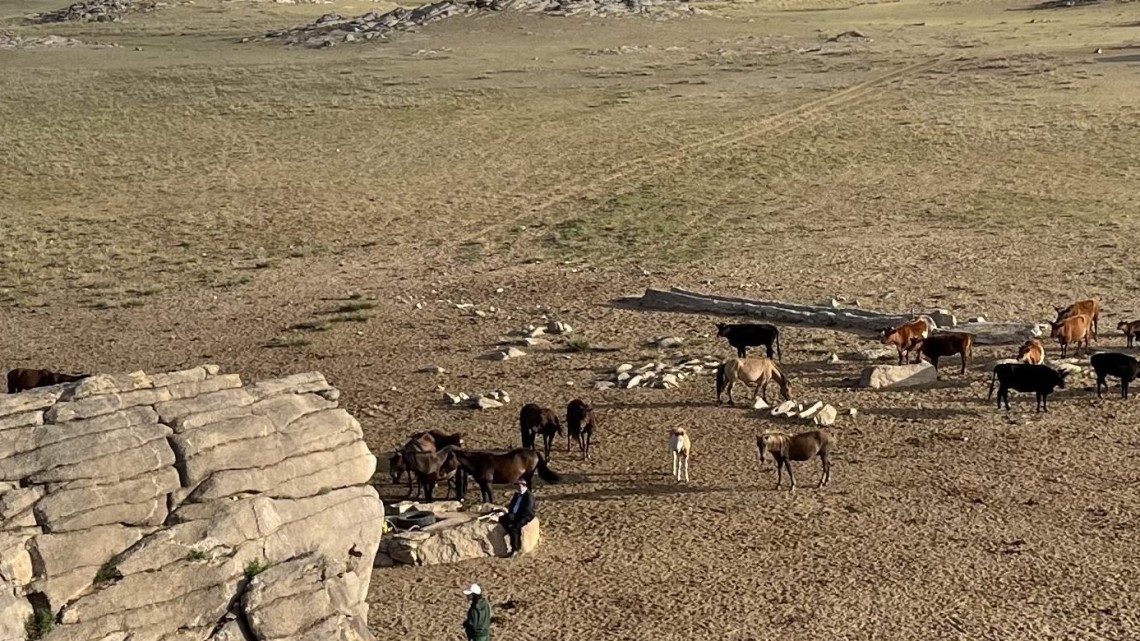
A herd of cows and horses visiting a well near the Ikh Nart Nature Reserve in Dornogovi Aimag (province), Mongolia.
News directly from Cornell's colleges and centers
Funding connects undergrads to sustainability research
By Krisy Gashler
Undergraduate students will have the opportunity to conduct summer research in one of four faculty-led projects funded by the Cornell Atkinson Center for Sustainability. Projects will explore livestock herding practices in Mongolia, remote sensing of the melting Greenland Ice Sheet, impacts of environmental warming on brook trout in New York and health outcomes for dairy cows and their calves.
The projects are funded by Atkinson’s Summer Undergraduate Mentored Research Grants, through which two undergraduates are mentored by a graduate student and a faculty principal investigator. The program seeks to support sustainability outcomes while providing students with immersive, collaborative research experiences. It launched successfully in summer 2023: All of the undergraduate students who participated in last year’s summer cohort presented their work at local or national research conferences, and some will be co-authors on peer-reviewed papers, said Beth Fox, director of student and postdoctoral programs for Cornell Atkinson.
“For undergraduates, mentored research is the gold standard for preparation for graduate school and other careers,” Fox said. “True to Cornell Atkinson’s goal of using seed grants to fertilize follow-on funding, two of our students also received further funding to continue their research.”
This year’s projects are:
Impacts of Rural Out-Migration on Traditional Livestock Herding Practices in Mongolia. Mongolia is home to one of the largest remaining grassland ecosystems in the world: Grassland comprises 73% of Mongolia and supports over 67.1 million head of livestock and almost 181,000 herding families. Nearly one-third of the nation’s population relies on livestock production as its primary livelihood. However, rapid social and demographic shifts in rural communities, in combination with a changing climate, are threatening sustainable management of herding and grassland resources. This project will take advantage of a recent survey of herders in Mongolia to investigate how contemporary changes in migration are impacting livestock management practices.
Faculty Lead: Ginger Allington (Natural Resources and the Environment, Cornell CALS)
Remote Sensing of Greenland’s Supraglacial Hydrology in a Changing Climate. The Greenland Ice Sheet has shrunk dramatically over the past two decades because of climate change. Satellite data shows that between 2002 and 2023, the ice sheet lost an average of 270 billion metric tons of ice per year, according to NASA. Understanding how the melting ice sheet will contribute to global sea level rise requires a more complete understanding of ice sheet hydrology. This project will use satellite optical remote sensing and airborne, ice-penetrating radar data to study how meltwater flows across the ice sheet surface and how some of that water is temporarily impounded in subsurface lakes. The researchers’ work will provide greater insight into how and why meltwater transport and storage pathways vary between different regions of the Greenland Ice Sheet.
Faculty Lead: Riley Culberg (Earth and Atmospheric Sciences, Cornell Engineering)
Selecting Strains of ‘Wild’ Food Fishes for Stocking to Enhance Adirondack Fisheries. New York’s Department of Environmental Conservation (DEC) operates 12 fish hatcheries statewide, which supply young fish for stocking the state’s public lakes and rivers with trout. However, climate change is making most Adirondack lakes unlivable for native brook trout, the state fish of New York. This project will compare fish growth rates and tissue nutrient content among the six strains of brook trout stocked by DEC, building upon recent findings that strains differ in temperature tolerances and that different lakes produce divergent concentrations of omega-3 fatty acids and heavy metals. Working at Cornell’s Adirondack Fishery Research Program field station, students will gain experience with fishery and climate change research methods. Their projects will clarify the potential for adjusting stocking practices to improve quantity and quality of brook trout under a changing climate.
Faculty Leads: Thomas Detmer and Peter McIntyre (both Natural Resources and the Environment, Cornell CALS)
Cow-Calf Contact Effects on Cow Udder Health and Calf Pneumonia Risk. Most U.S. dairy farmers follow current management recommendations to immediately separate a cow from her calf after she gives birth. However, recent research suggests that prolonged cow-calf contact may reduce the risk for mastitis in cows and respiratory disease in calves, lessening the need for antibiotics. While addressing food insecurity is of paramount importance globally, it is critical to ensure that solutions do not come at the detriment of livestock health and welfare, that they fulfill sustainable production needs and that they meet consumer expectations. This project will evaluate differences in health and behavior between cows and calves that have prolonged contact or are separated immediately after birth. In addition to participating in collaborative research, an undergraduate will lead an independent part of the study focusing on cow udder health and milk production, or on calf lung health.
Faculty Lead: Sabine Mann (Population Medicine and Diagnostic Sciences, CVM)
Krisy Gashler is a freelance writer for Cornell Atkinson.
Media Contact
Get Cornell news delivered right to your inbox.
Subscribe
